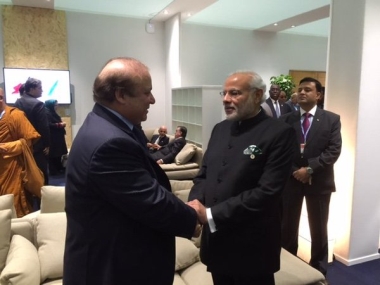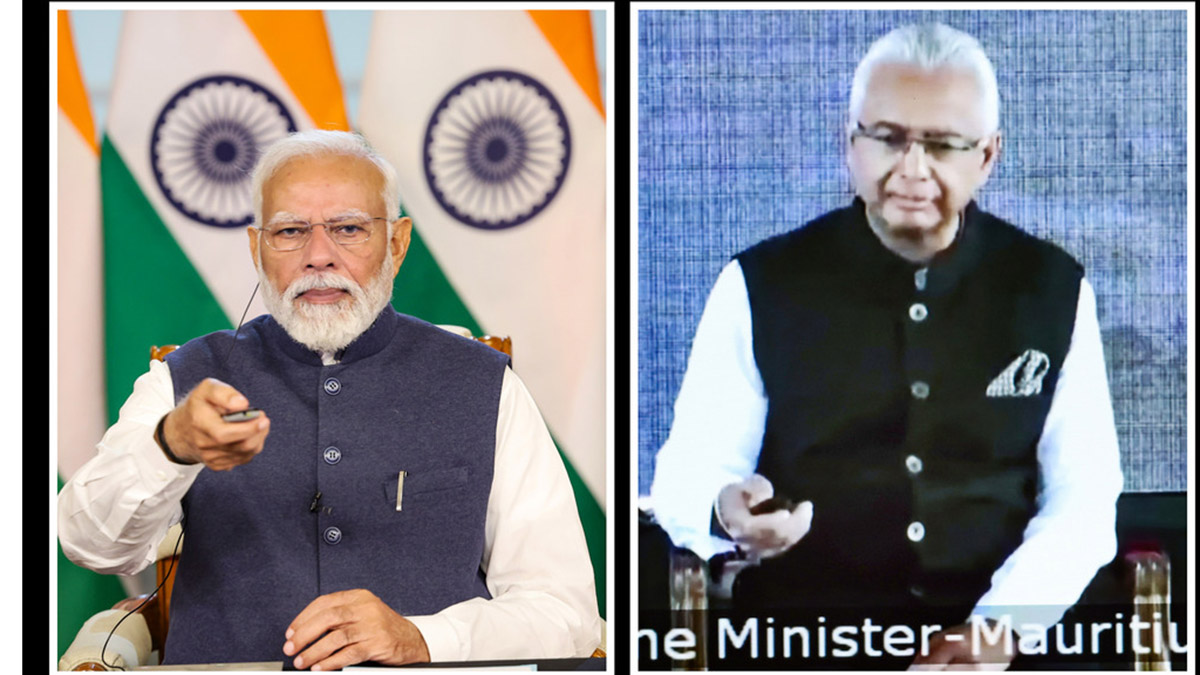Following Prime Minister Narendra Modi’s whirlwind visit to Moscow and a fleeting stopover in Kabul, he announced on Friday that he will be stopping at Lahore in the afternoon en route New Delhi. And during this brief visit, he will have an airport meeting and lunch with Pakistan Prime Minister Nawaz Sharif… on his birthday. Infact, latest news updates have confirmed that the Prime Minister arrived at Lahore airport.
After tweeting birthday greetings to the Pakistani PM, Modi revealed his plans over the course of a few tweets:
I wish the Prime Minister of Pakistan, Mr. Nawaz Sharif on his birthday and pray that he remains in wonderful health.
— Narendra Modi (@narendramodi) December 25, 2015
Spoke to PM Nawaz Sharif & wished him on his birthday.
— Narendra Modi (@narendramodi) December 25, 2015
Looking forward to meeting PM Nawaz Sharif in Lahore today afternoon, where I will drop by on my way back to Delhi.
— Narendra Modi (@narendramodi) December 25, 2015
But there’s more to this brief visit than meets the eye.
South Asia has been in flux for decades now, and it appears that a concerted multilateral effort among political leaderships to bring order to the region is underway. What’s most intriguing is that a lot of these efforts are taking place by stealth.
Here’s a brief rundown:
India-Pakistan relations under Modi got off to a warm start, especially with his invitation to Nawaz for the Indian prime minister’s swearing-in ceremony in May 2014. But, the abandonment of foreign secretary-level talks three months later put bilateral relations on ice for the umpteenth time in the history of the two countries. A month later, national security advisor-level talks went the same way.
In the public eye, ties between New Delhi and Islamabad ranged from cold at best, to hostile.
But behind the scenes, as became clear earlier this year , diplomatic manoeuvres were underway.
At the 2014 Saarc Summit in Kathmandu, Modi and Nawaz were frosty towards each other, shaking hands almost begrudgingly. But as it turned out, the two prime ministers held a ‘secret meeting’ in the confines of Indian steel magnate Sajjan Jindal’s hotel room. The meeting had also been organised by Jindal reportedly at the behest of Modi.
Outwardly, both heads of government maintained their belligerence.
And then came Ufa in July this year, where on the sidelines of the SCO Summit, the duo held another discreet meeting — this time in one of the meeting rooms of the Congress Hall , after which a joint statement was issued. Once again, voices on both sides shrilly condemned the deal for their own reasons. Congress spokesperson Anand Sharma dismissed the statement as an ‘ eyewash ’ and ‘ not even worth the paper it was written on ’. Meanwhile in Pakistan, Nawaz came under fire for the absence of the word ‘Kashmir’ in the statement.
Then at the UN General Assembly a couple of months later, the Pakistani PM chose the public platform of the UNGA High Level Segment to criticise India over its stand on Jammu and Kashmir. This was quickly countered , again very publicly by Abhishek Singh, first secretary, Permanent Mission of India to the UN, who slammed Pakistan’s ‘policies of breeding and sponsoring terrorists’. Less than a month later, Nawaz went ’nuclear’. That is to say he brought up the N-word.
In an address to a US Congress think-tank, he accused India of engaging in a ‘major arms build-up’. “(India) has adopted dangerous military doctrines. This will compel Pakistan to take several counter measures to preserve credible deterrence,” he told his audience .
A little over a year after the Kathmandu summit and amid all sorts of antagonistic statements from cabinet members from both governments, Modi and Nawaz would then meet in a low-profile engagement on the sidelines of the Paris Climate Change Summit:
PM @narendramodi meets PM Nawaz Sharif at COP 21 in Paris pic.twitter.com/HRiY1xLoBM
— Randhir Jaiswal (@MEAIndia) November 30, 2015
Soon after, came the ‘secret’ meeting in Bangkok between national security advisors Ajit Doval and Nasir Janjua, miles away from the media glare in India and Pakistan. External Affairs Minister Sushma Swaraj even made a visit to Pakistan officially for the Heart of Asia Summit — but presumably to also lay the foundation for Modi’s call on birthday boy Nawaz — where apart from the Pakistani PM, she met Advisor to Pakistan Prime Minister on Foreign Affairs Sartaj Aziz as well.
Nevertheless, opprobrium continued to pour forth in public pronouncements, with former minister Rehman Malik firing a salvo about India ‘creating hurdles’ Afghanistan-Pakistan relations.
Which all brings us neatly to the present.
At his address to Afghan parliamentarians in Kabul, Modi took thinly-veiled potshots at Pakistan without naming the country — a remark that the media was quick to latch onto. Less obvious but more indicative of what appears to be underway, was this statement roughly halfway through his speech : “(A)ll of us in the region — India, Pakistan, Iran and others — must unite, in trust and cooperation, behind this common purpose and in recognition of our common destiny”.
The more cynical among you may dismiss the ‘common destiny’ part as mere rhetoric, but pieces seem to be slowly moving into shape. Peace talks between the Afghan government and the Taliban, which were brokered by Pakistan, are reportedly back on the agenda. Reuters quoted a senior Pakistani official on Monday as saying that the resumption of talks should take “not longer than two weeks,” and adding, “I would say the first week of January we will see the process restart again.” Meanwhile just across the border, Afghan security forces arrested a suicide bomber who had designs on attacking the Indian Consulate in Jalalabad, a city that lies on the Afghanistan-Pakistan border. Are these events unconnected? Perhaps.
But right after Modi calls on Sharif, this is going to happen:
#COAS will visit Kabul on Sunday,27th Dec.During his day long visit,Will hold meetings with Political and mil leadership of Afgn.
— Gen(R) Asim Saleem Bajwa (@AsimBajwaISPR) December 25, 2015
With the announcement that Pakistan Chief of Army Staff Raheel Sharif is set to visit Kabul on Sunday, the idea that everybody is slowly trying to pull in the same direction or find a common mimimum — which in this case, could well be securing Afghanistan — is admittedly optimistic, but not out of the question. Of course, Raheel might simply be on his way to throw a spanner in the works of India-Afghanistan relations. Or maybe the Modi-Nawaz meeting will end on a bitter note. Or maybe that’s just what they want you to think.
It is a distinct possibility and one that has been explored before ( read Sandipan Sharma’s piece here ) that the realisation has dawned on the powers-that-be that diplomacy cannot be conducted in the media. And if it’s a notion that translates into positive effects for the region, we’re all for it.
For now, we’ll keep our eyes on these two prime ministers and what they have to say, publicly first and privately when Barkha Dutt writes her next book.


)




)
)
)
)
)
)
)
)